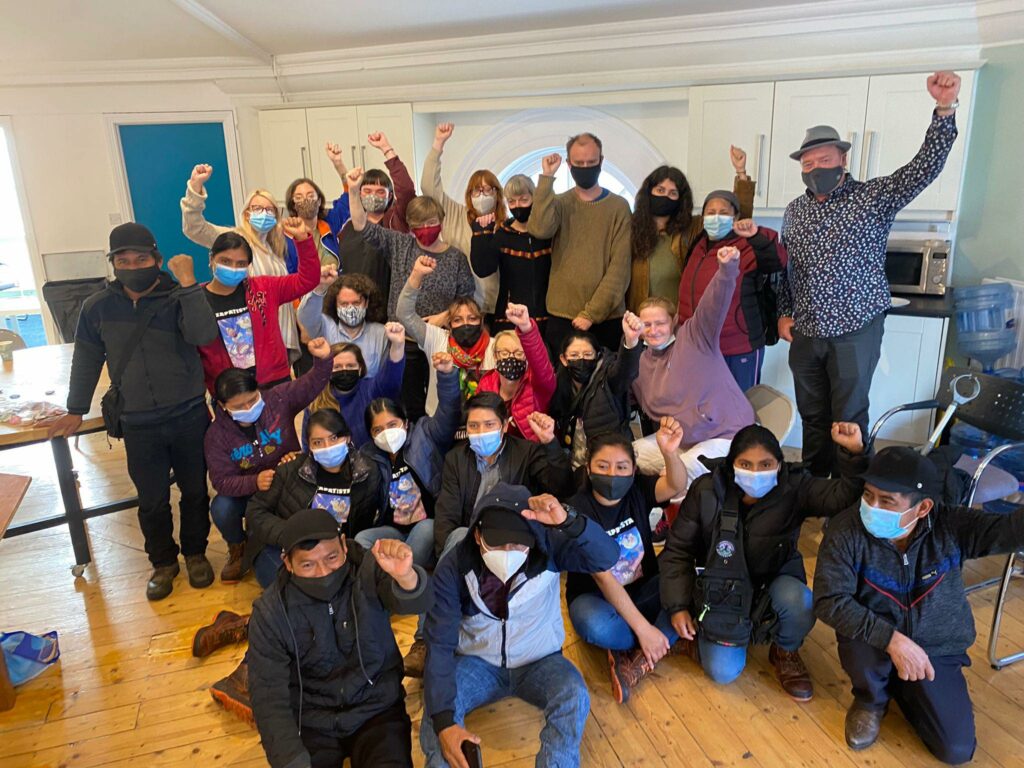
The Journey for Life, Dublin
The Zapatista delegation arrived in Ireland on October 12th and visited Dublin from October 18th to Friday 22nd, 2021. Their visit included meetings with grassroot organisations focusing on labour, housing, gender, abolition, and racism. A group of 14 delegates, seven men and seven women attended all the activities. The structure of the meetings usually consisted of different delegates giving a brief presentation on the history of the Zapatista struggle, and then answering questions of the attendees. I had the opportunity to participate as an interpreter during their visit. In my view, one of the most striking aspects of the experience was the bringing together of differences into one space and having those differences try to communicate with each other.
Comments from attendees highlighted the fact that collectives or organisations that would not have come together otherwise, had found themselves in the same space. The process of understanding the difference of the “other” was also felt in some of the Q&A sessions as they elucidated stark contrasts in lived experiences. For instance: a radical feminist group was challenged by a Zapatista delegate when one of their members strongly stated that their collective did not welcome men. The delegate seemed surprised and inquired what then was the future of collaboration. In another instance, after speaking in favor of diversity, the delegates were asked what was the experience of same-sex parenting in the Zapatista communities. To the surprise of many, the response was that such experience did not take place. Even though the Zapatistas have welcomed the speech of sexual diversity, their experience back home does not seem to have to deal with those issues. Conversations like these brought about awkward moments of hesitation: how much more to ask? How to ask the question? Nonetheless, the exercise alone forced both delegates and attendees to sit with that discomfort, which some of us interpreted as a learning experience.
Furthermore, a few attendees pointed out that the delegates’ speeches were very long, sometimes not leaving enough time for questions or introductions. The Zapatista delegates described the process of decision making in Good Government Councils, but maybe what was missed by members of the audience is that their experience of time may be dissimilar to capitalist Western time. The communities speak for hours in general assemblies, and so that time was somewhat reenacted in Dublin, where the rushed individualistic impulse to speak was slowed down by a group who spoke with one voice. In this regard, all delegates in Dublin seemed to have learned the narrative they would share abroad and only strayed from it in some of the Q&A sessions. It was either in the moments of relaxation or of tension because of a momentary breakdown in understanding, that the narrative gave way to improvisation and spontaneity.
The overall feeling in the group that coordinated the visit in Ireland was one of gratitude. People were grateful for the opportunity to interact with the delegates so closely and to hear their stories. It seemed incredible to be sharing that experience. Also, we were amazed at the willingness of those involved to contribute in whatever way they could to the visit. People put their time and energy into trying to make sure that the delegates were comfortable and it all felt as a very wholehearted endeavour. The Zapatista delegation had been able to bring together collectives that would otherwise rarely meet and had united them in one goal: their visit.
Even though some struggled to understand different aspects of the experience and vision that the Zapatistas embody, they were able to welcome the distance of difference. That tension, I think, is a source of learning, a moment where not everything fits perfectly together and where we have to find ourselves and each other in ambiguity. Maybe a visual metaphor of this encounter is as follows: as we accompanied part of the Zapatista delegation to their scheduled engagements, a single file of short indigenous men and women from the mountains of the Mexican southeast walked along Pearse Street. Some stared at the group inquisitively, some rushed ahead with indifference, and some of us saw that unusual scene as a powerful reminder of what is still possible through solidarity.
